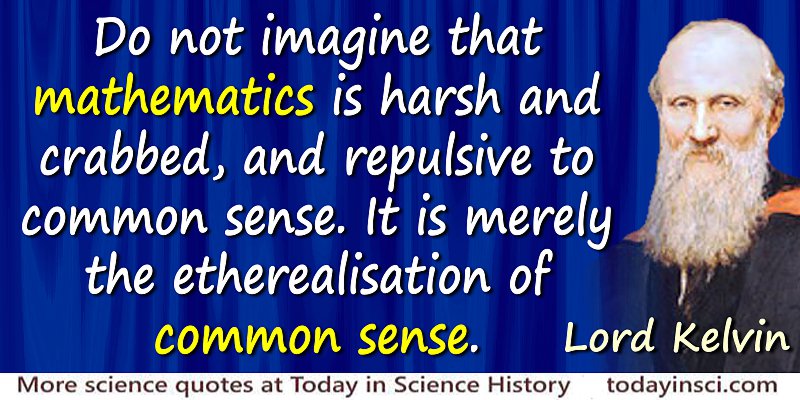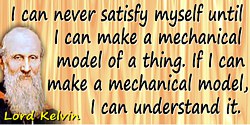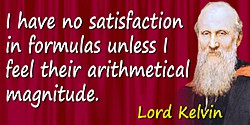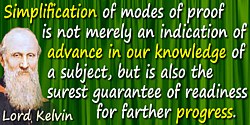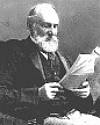 (source)
(source)
|
Baron William Thomson Kelvin
(26 Jun 1824 - 17 Dec 1907)
Irish physicist, mathematician and engineer , born as William Thomson in Ireland, he became an influential physicist, mathematician and engineer who has been described as the Newton of his era.
|
William Thomson Kelvin
“Mathematics is … etherealisation of common sense”
Illustrated Quote - Large (800 x 400 px)
More William Thomson Kelvin quotes on science >>
In his Presidential Address to the Birmingham and Midland Institute, delivered in the Town Hall, Birmingham on 3 Oct 1883, Lord Kelvin spoke on his topic of “The Six Gateways of Knowledge.” He went on to develop answers to the question with which he opened his talk: “What are the means by which the human mind acquires knowledge of external matter?” His lecture title was a reflection of the how
“John Bunyan likens the human soul to a citadel on a hill, self-contained, having no means of communication with the outer world, except by five gates—Eye Gate, Ear Gate, Mouth Gate, Nose Gate, and Feel Gate. Bunyan clearly was in want of a word here. He uses ‘feel’ in the sense of ‘touch’; a designation which to this day is so commonly used, that I can scarcely accuse it of being incorrect. At the same time, the more correct and distinct designation undoubtedly is, the sense of touch.”
Kelvin designated six senses by dividing the sense of touch into two: a sense of roughness and a sense of heat.
Later in his talk, Kelvin referred to the important of graphical illustration, employed both in mathematical graphs of physical phenomena (such as the variation of air pressure with time representing sound) and in such realms as business.
“Do not imagine that mathematics is harsh and crabbed, and repulsive to common sense. It is merely the etherealisation of common sense.”
As an example, he said,
“in a thousand counting-houses and business offices in Birmingham and London, and Glasgow and Manchester, a curve, as Professor Cayley pointed out, is regularly used to show to the eye a function of one independent variable. The function of one independent variable most important in Liverpool perhaps may be the price of cotton.”
- Science Quotes by Baron William Thomson Kelvin.
- 26 Jun - short biography, births, deaths and events on date of Kelvin's birth.
- Lord Kelvin Biography - one of the earliest pages written for this site.
- A Kelvin Biography - with more background on Kelvin’s early scholarship in mathematics and his life’s work, from Famous Men of Science.
- William Thomson Kelvin - context of quote “Make a mechanical model” - Medium image (500 x 250 px)
- William Thomson Kelvin - context of quote “Make a mechanical model” - Large image (800 x 400 px)
- William Thomson Kelvin - context of quote “Many of the greatest advances” - Medium image (500 x 250 px)
- William Thomson Kelvin - context of quote “Many of the greatest advances” - Large image (800 x 400 px)
- William Thomson Kelvin - context of quote “The rewards of accurate measurement” - Medium image (500 x 250 px)
- William Thomson Kelvin - context of quote “The rewards of accurate measurement” - Large image (800 x 400 px)
- William Thomson Kelvin - context of quote “I have no satisfaction in formulas” - Medium image (500 x 250 px)
- William Thomson Kelvin - context of quote “I have no satisfaction in formulas” - Large image (800 x 400 px)
- William Thomson Kelvin - context of quote “Mathematics is … etherealisation of common sense” - Medium image (500 x 250 px)
- William Thomson Kelvin - context of quote “Measure … and express in numbers” - Medium image (500 x 250 px)
- William Thomson Kelvin - context of quote “Measure … and express in numbers” - Large image (800 x 400 px)
- William Thomson Kelvin - context of quote “Imaginary difficulty of making a change” - Medium image (500 x 250 px)
- William Thomson Kelvin - context of quote “Imaginary difficulty of making a change” - Large image (800 x 400 px)
- William Thomson Kelvin - context of quote “Questions of personal priority” - Medium image (500 x 250 px)
- William Thomson Kelvin - context of quote “Questions of personal priority” - Large image (800 x 400 px)
- William Thomson Kelvin - context of quote “Science is not antagonistic to religion” - Medium image (500 x 250 px)
- William Thomson Kelvin - context of quote “Science is not antagonistic to religion” - Large image (800 x 400 px)
- William Thomson Kelvin - context of quote “Simplification of modes of proof” - Medium image (500 x 250 px)
- William Thomson Kelvin - context of quote “Simplification of modes of proof” - Large image (800 x 400 px)
- William Thomson Kelvin - context of quote “Mathematics is the only true metaphysics” - Medium image (500 x 250 px)
- William Thomson Kelvin - context of quote “Mathematics is the only true metaphysics” - Large image (800 x 400 px)
- Excellent Kelvin Biography history at the BBC education site for the Local Heroes TV series.
- Construction details for "Kelvin's Thunderstorm" - Lord Kelvin's water-drop electrostatic generator..
- Kelvin at three different ages - a photo gallery across his life.
- Collection of pictures of Kelvin at different ages - at the MacTutor site.
- Informative Biography of Kelvin - with additional resources at the MacTutor site.
- History of Submarine Cables - a 150 Year History of Submarine Cables.
- Timeline of Atlantic Cables - 1856 to 2015.
- Lord Kelvin's Conjecture Disproved - A modern improvement on Kelvin's 1887 geometrical conjecture.
- Degrees Kelvin: A Tale of Genius, Invention, and Tragedy, by David Lindley. - book suggestion.
- Booklist for William Thomson.
